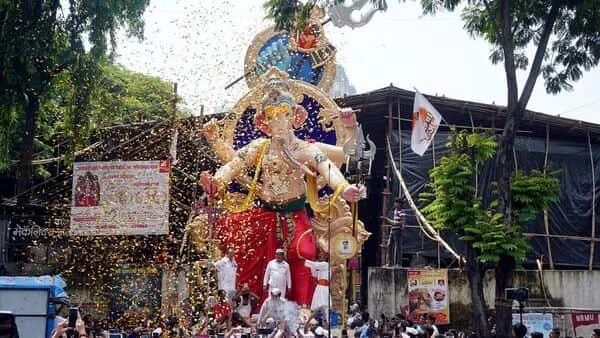Ganesh Chaturthi
After two years of restricted celebration, preparations are in full swing for the ten-day long auspicious Ganesha festival. This festival is celebrated with huge pomp and show by the people across India. However, it is mainly celebrated in Maharashtra, Telangana, Andhra Pradesh, Maharashtra, etc.
People welcome Ganpatti Bappa by installing Lord Ganesha idols in their homes on the first day of the festival. Devotees decorate and worship the elephant-headed God and then bid adieu to him by immersing the idols in water after three, five, or ten days. The duration of keeping Lord Ganesha idols at home for worshipping completely depends upon the devotees. There are plenty of stories and beliefs behind the celebration of this festival. Know about some of them and the auspicious timings of Ganesh Sthapna and Visarjan here.
Birth of Lord Ganesha
It is believed that Lord Ganesha was born on the Chaturthi Tithi of Shukla Paksha in the Bhadrapada month, which falls on 31 August this year as per the Gregorian calendar.
The famous story of Lord Ganesha's birth which finds its mention in some historical scriptures, says that Goddess Parvati made Lord Ganesha with the sandalwood paste that she used for bathing. She asked him to guard the entrance until she comes after bathing. While performing his duty, Lord Shiva came and tried to meet his wife. On being denied by Lord Ganesha to meet Goddess Parvati, Lord Shiva got furious and separated Lord Ganesha's head from his body. On seeing this Goddess Parvati was enraged in anger and asked to destroy everything if she doesn't get her son back. Seeing the situation worsening lord Shiva asked to bring the head of a baby animal whose mother was facing the other way from her child.
Fulfilling this condition, a baby elephant's head was chosen for the task, after which Lord Shiva attached the elephant head to Lord Ganesha's body. Since then, the day is celebrated as Ganesh Chaturthi.
Ganesha festival, as a symbol of patriotism
The celebration of the festival in a grand way dates back to the time of Chatrapati Shivaji Maharaj. However, the festival was reincarnated by Bal Gangadhar Tilak to unite the people and bridge the gap of casteism among them. He set up the first and oldest Mandal, Kesha Keshavi Naik Chawl Sarvajanik Ganeshotsav Mandal at Girgaum in 1893. To instil the spirit of nationalism, he also began the tradition of installing Lord Ganesha Idol during the festival. People believe that he was the first person to install a large clay idol of Lord Ganesh in a public place and started the 10-day long affair.
Muhurat and timings
The festival will begin on Ganesh Chaturthi which is falling on 31 August this time. However, the Ganesh Chaturthi tithi will fall between 30 and 31 August. The Tithi time will begin at 3:33 pm on 30 August and will last till 3:22 pm the next day. Anant Chaturdashi falling on 9 September will mark the end of the festival when devotees will immerse the Ganesha idol in water.
Avoid moon sighting on Ganesh Chaturthi
According to ancient beliefs, one should avoid moon sighting at night on Ganesh Chaturthi. Sighting the moon on this occasion creates Mithya Dosham or Mithya Kalank on any person.
According to the Hindu calendar, one should avoid moon sighting on 30 August from 3:33 pm to 8:40 pm and between 9:29 am to 9:10 pm on 31 August.


